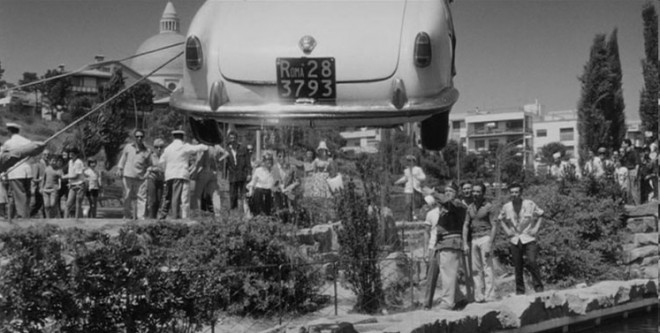What does a fictional filmmaker do? Outstanding ones attend to giving form, most notably visual form, to ideas they have that contribute to a work’s thematic development. This involves filling and composing frames (mise-en-scène) expressively rather than perfunctorily (to advance a plot) or decoratively (to create attractive visual designs). It also involves choosing how to use the camera: where to place it, how and when to move it—and always why to do whatever one does with it. A filmmaker’s closest artistic collaborator may be his or her cinematographer; but a certain kind of filmmaker—let’s call this kind a storytelling hack—abdicates visual responsibility to the cinematographer, who then attends to what is the filmmaker’s primary function, but without what only the filmmaker can supply: the thematic or expressive reason(s) behind each camera placement or movement, each detail of lighting, etc. For such a hack as this, the story, the plot, isn’t a vehicle for ideas or anything else; it’s an end in itself—or, worse, something to which a BIG MESSAGE comes attached. This hack’s primary relationship isn’t with material he or she hopes to develop but with an audience he or she hopes to involve, excite, move or otherwise manipulate. Very often such filmmakers interpret “director” as meaning “director of actors.” Most often, those who make “TV movies” for U.S. broadcast, because of rushed shooting schedules, can be little else.
But let’s face it: We sometimes enjoy a made-for-TV movie. It may make us laugh; it may make us cry; it may make us feel good. After a hard day’s work, it can pleasantly numb us into a refreshing sleep. It lacks the demanding intelligence of art. A little Kiarostami or Godard can rattle like poison, but the sweet narcotic of brain-dead “entertainment” can be like a soothing cup of chamomile tea.
Nir Bergman is a writer-director in Israel. In his early thirties he made Broken Wings (Knafayim Shvurot), which comes to us festooned with international prizes. Bergman won at Jerusalem and Tokyo, he won three prizes at Berlin, and the Israeli Film Academy named both his writing and directing the best of the year, in addition to naming the film the year’s best. It’s a sentimental, borderline trite thing, this Broken Wings of his; but it could have been a lot worse. Bergman is an “artist” of low ambitions. These are his own words in reference to Israeli filmmaking and Broken Wings: “It’s just about wanting people to share the experiences of these characters.” Imagine trying to fit the glorious cinema of Israel’s Amos Gitaï into such a narrow dictum!
If one accepts its limited aims, one can easily like this film. There isn’t a single shot in the whole film that tests one’s ability to analyze mise-en-scène. It’s a family tearjerker. Whatever its ostensible “humane” message (here, that the family, when dealt blows by death and injury or illness, can heal its surviving members), such a film generates complacency; it is liberal and reactionary. There is nothing progressive about films that hammer home clichés about the value of family. But if a viewer expects this, anticipates this, he or she is unlikely to be harmed in any way by any of it—at least if he or she, the following night, reads Anna Karenina or Milton or (re)visits a masterpiece by Carl Theodor Dreyer.
Broken Wings focuses on a middle-class family, the Ullmans, in Haifa. Nine months earlier the family patriarch unexpectedly died from an allergic reaction to a bee sting, sending his widow, Dafna, to bed in a tailspin of despondency. Now she is back at work at a maternity hospital. All four children have been shattered by their father’s death or their mother’s subsequent neglect: 17-year-old Maya, who has had to take up the maternal slack in the family and neglect her music; her twin brother, Yair, who, having dropped out of high school, passes out subway flyers while dressed in a mouse costume; their younger brother, Ido, one of whose suicidal acts lands him in a coma, compounding the family misery and milking suspense; and their baby sister, Bahr, who must feel awfully abandoned. The disclosure of how the father died is strategically delayed; one expects, initially, that Palestinian terrorism is the cause (and, symbolically, may indeed be). A little more delayed is the disclosure of the reason for Maya’s gargantuan burden of guilt for her father’s death. The revelations in this sort of film come tumbling out.
For the most part, the film is badly acted, particularly by Maya Maron, who emotes rather than acts the critical role of Maya. Nonetheless, this untalented teen was named by the Israeli Film Academy best supporting actress. Far more deserving of her best actress prize, however, is Orli Zilberschatz-Banai, who is superb as Dafna, exhausted, wounded, desperate to hold her family together.
I also have named Zilberschatz-Banai 2002’s best actress, so it’s useless for me to pretend that I don’t want people to see this film. Zilberschatz-Banai’s humanity, as Dafna, transcends all the sentimental contrivance and manipulation that Bergman throws at us. I wish her gem of a performance, however, had appeared in a more fortuitous setting.
